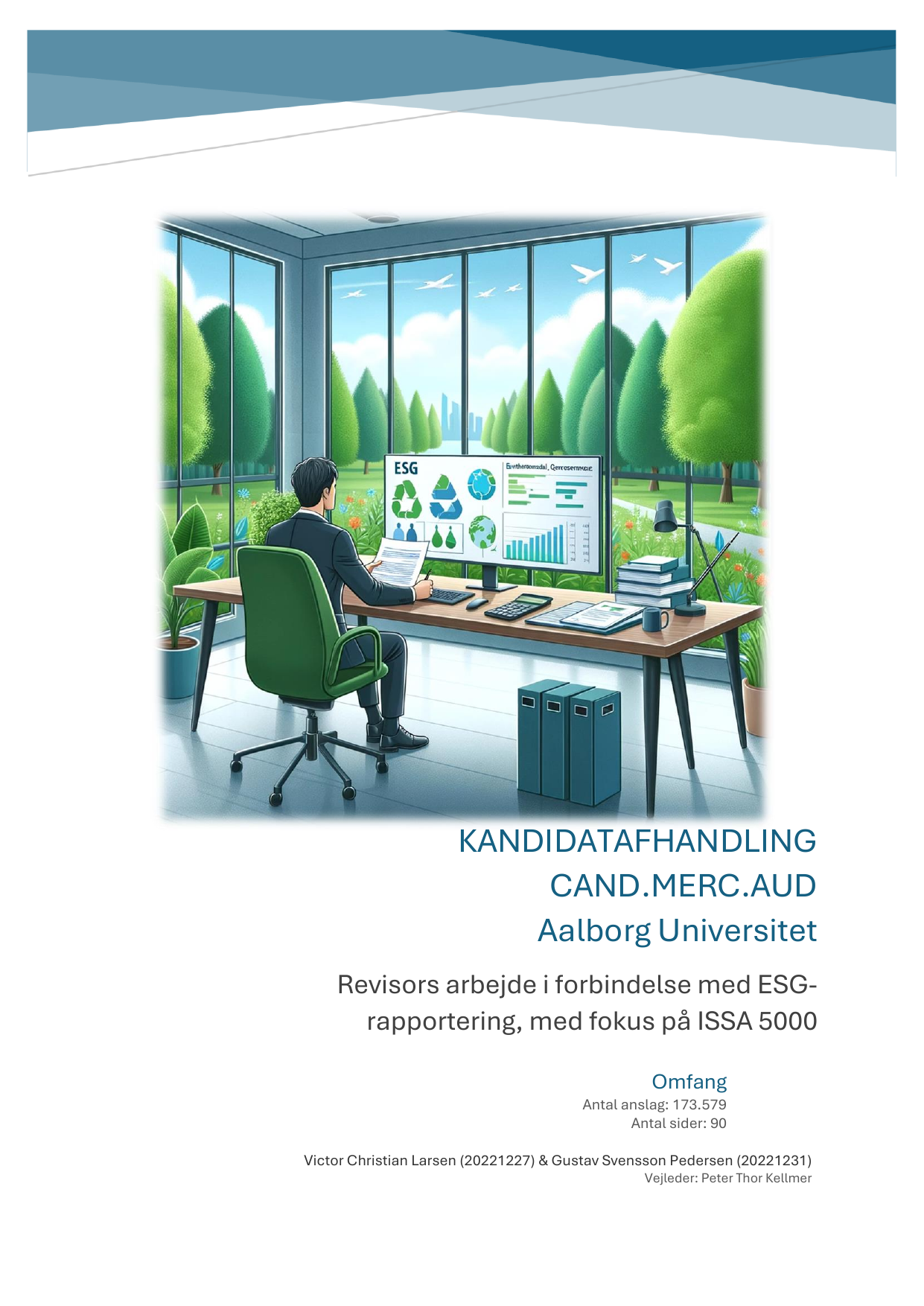
Revisors arbejde i forbindelse med ESG-rapportering, med fokus på ISSA 5000: Hvordan kontrollerer og sikrer revisorer sig rapportering omkring ESG sker på korrekt grundlag og hvilke forskelle vil der komme ved at gå fra finansiel revision til non-financial revision?
Oversat titel
Auditor's work in connection with ESG reporting, with a focus on ISSA 5000: How do auditors check and ensure that reporting about ESG is done on the correct basis and what differences will come from going from financial audit to non-financial audit?
Forfattere
Semester
4. semester
Uddannelse
Udgivelsesår
2024
Afleveret
2024-06-02
Antal sider
90
Abstract
The master thesis focuses on the significant and growing importance of Environmental, Social, and Governance (ESG) reporting, particularly emphasizing the environmental aspect. It investigates how the introduction of the ISSA 5000 standard will impact auditors' approaches to verifying ESG reports, compared to the existing ISAE 3000 standard. In recent years, sustainability has become a central focus for businesses globally, driven by increasing environmental challenges and the realization that long-term economic success is intricately linked to responsible environmental stewardship. ESG reporting has emerged as a crucial tool for companies to communicate their sustainability efforts and performance to stakeholders, including investors, customers, and regulatory authorities. This thesis explores the evolving landscape of ESG reporting, with a specific focus on environmental reporting and the role of auditors in ensuring the reliability and credibility of these reports. It examines the existing ISAE 3000 standard used for sustainability assurance and compares it to the forthcoming ISSA 5000 standard, which is specifically designed for sustainability reporting. To delve into our problem statement, the following research questions have been formulated: 1. To analyze how ISSA 5000 differs from ISAE 3000 and its implications for auditors. 2. To explore the methods auditors, use to gather and evaluate evidence for the accuracy of environmental data in ESG reports. 3. To assess the challenges auditors face in transitioning from financial to non-financial reporting, particularly concerning environmental aspects. 4. What impact does ISSA 5000 have on the auditor’s materiality approach? The research employs a mixed-methods approach, including semi-structured interviews with certified sustainability auditors and document analysis of relevant reports and standards. The study focuses on identifying risks, data collection techniques, and the overall impact of transitioning to ISSA 5000 on the auditing profession.
The master thesis focuses on the significant and growing importance of Environmental, Social, and Governance (ESG) reporting, particularly emphasizing the environmental aspect. It investigates how the introduction of the ISSA 5000 standard will impact auditors' approaches to verifying ESG reports, compared to the existing ISAE 3000 standard. In recent years, sustainability has become a central focus for businesses globally, driven by increasing environmental challenges and the realization that long-term economic success is intricately linked to responsible environmental stewardship. ESG reporting has emerged as a crucial tool for companies to communicate their sustainability efforts and performance to stakeholders, including investors, customers, and regulatory authorities. This thesis explores the evolving landscape of ESG reporting, with a specific focus on environmental reporting and the role of auditors in ensuring the reliability and credibility of these reports. It examines the existing ISAE 3000 standard used for sustainability assurance and compares it to the forthcoming ISSA 5000 standard, which is specifically designed for sustainability reporting. To delve into our problem statement, the following research questions have been formulated: 1. To analyze how ISSA 5000 differs from ISAE 3000 and its implications for auditors. 2. To explore the methods auditors, use to gather and evaluate evidence for the accuracy of environmental data in ESG reports. 3. To assess the challenges auditors face in transitioning from financial to non-financial reporting, particularly concerning environmental aspects. 4. What impact does ISSA 5000 have on the auditor’s materiality approach? The research employs a mixed-methods approach, including semi-structured interviews with certified sustainability auditors and document analysis of relevant reports and standards. The study focuses on identifying risks, data collection techniques, and the overall impact of transitioning to ISSA 5000 on the auditing profession.
